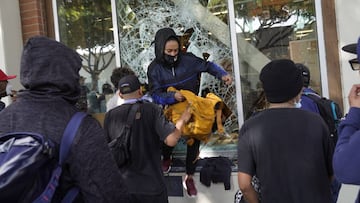George Floyd protests: what is ANTIFA and who is behind it?
US President Donald Trump has placed Antifa on the terror list following violent protests across the country after the death of George Floyd.

U.S. President Donald Trump said on Sunday the U.S. government will designate anti-fascist group Antifa as a terrorist organization, a move that legal experts say would be hard to execute. Antifa follows far-left ideologies such as anti-capitalism and take up causes such as LGBTQ and indigenous rights
The announcement, made by Trump on Twitter, comes amid violent nationwide protests about police brutality following the death of George Floyd in Minneapolis seen on video gasping for breath as a white police officer knelt on his neck.
Several top officials from the Trump administration, including U.S. Attorney General William Barr, have blamed Antifa and other "agitators" for taking over the protests in U.S. cities.
"The violence instigated and carried out by Antifa and other similar groups in connection with the rioting is domestic terrorism and will be treated accordingly," Barr said in a statement on Sunday following the president's tweet.
It is not clear how many, if any, of the protesters participating in demonstrations across the country are from Antifa, which experts note is not an organization but rather an amorphous movement.
Trump has "no authority" to name Antifa a terrorist group
John Harrington, the head of Minnesota's Department of Public Safety, told a news conference on Sunday that about 20% of Saturday's arrest records were for people out-of-state, though he did not yet have the total for Saturday night's arrests.
Trump's tweet Sunday is not the first time the president has described Antifa as a terrorist group. Other conservative politicians, such as Texas Senator Ted Cruz, have made similar statements.
It is unclear whether the Trump administration is seriously pursuing the designation through formal channels, which would typically require coordination across multiple federal agencies.
Experts say Trump lacks the legal authority to do so.
"Terrorism is an inherently political label, easily abused and misused," said ACLU National Security Project Director Hina Shamsi.
Related stories
Mary McCord, a former senior Justice Department official, said "no current legal authority exists for designating domestic organizations as terrorist organizations."
"Any attempt at such a designation would raise significant First Amendment concerns," added McCord, who previously served in the Trump administration.

